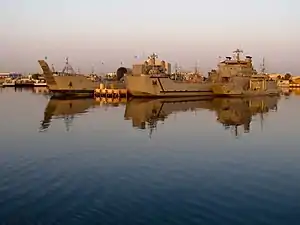 USAV SSGT Robert T. Kuroda (LSV-7) | |
| Class overview | |
|---|---|
| Builders | VT Halter Marine, Inc. |
| Operators | |
| Subclasses |
|
| Built | 1987–2006 |
| In commission | 1988–present |
| Planned | 8 |
| Completed | 8 |
| Active | 8 |
| General characteristics | |
| Type | Logistics support vessel |
| Displacement | 4,199 long tons (4,266 t) |
| Length | 273 ft (83 m) |
| Beam | 60 ft (18 m) |
| Draft | 12 ft (3.7 m) |
| Propulsion | 2 × EMD 16-645E2; 1,950 hp (1,454 kW) each at 999 rpm |
| Speed |
|
| Range |
|
| Complement | 8 officers, 23 enlisted |
General Frank S. Besson-class logistics support vessels (LSV) are the largest powered watercraft in the United States Army, and are designed to give the Army a global strategic capability to deliver its vehicles and cargo.[1]
Design
Named in honor of Gen. Frank S. Besson Jr., former Chief of Transportation, U.S. Army, these ships have bow and stern ramps and the ability to beach themselves, giving them the ability to discharge 900 short tons of vehicles and cargo over the shore in as little as four feet of water, or 2,000 short tons as an intra-theater line haul roll-on/roll-off cargo ship.[2] The vessel's cargo deck is designed to handle any vehicle in the US Army inventory and can carry up to 15 M1 Abrams main battle tanks or 82 ISO standard containers.[3]
Subclasses
The Robert T. Kuroda is the lead vessel of a new subclass of the Frank S. Besson class called LSV (MOD). The Kuroda, named after Robert T. Kuroda, and its sister ship, the Smalls, named after Robert Smalls, are generally similar to the rest of the class except that the ships are 42 feet (13 m) longer than the other ships of the class. This is due to a more streamlined "visor" bow that hides the front ramp and allows for the vessels to move through rough water more easily. While these ships have the same main deck area as the rest of the class—10,500 square feet (980 m2)— however they displace 6,000 short tons (5,400 t), can make 10,000 U.S. gallons (38,000 L) of water a day, have incinerators for burning trash, are taller than the traditional Besson-class LSVs, and have 25% more horsepower. The ship has a range of more than 5,500 nautical miles (10,200 km) and can deploy fully provisioned worldwide at a speed of 12 knots (22 km/h) carrying a standard port-opening package weighing 1,000 short tons (910 t).[3]
Related classes
The Philippine Navy commissioned two Bacolod City-class logistics support vessels during the early 1990s. These ships were based on a helicopter-capable variant of the General Frank S. Besson Jr.-class logistics support vessel. MWT-03
Ships
- USAV General Frank S. Besson Jr. (LSV-1) – 335th Transportation Detachment, 7th Expeditionary Transportation Brigade
- USAV CW3 Harold C. Clinger (LSV-2) – 489th Transportation Detachment, USAR
- USAV General Brehon B. Somervell (LSV-3) – 805th Transportation Detachment, 8th Theater Sustainment Command
- USAV Lt. General William B. Bunker (LSV-4) – 1099th Transportation Detachment, 7th Expeditionary Transportation Brigade
- USAV Major General Charles P. Gross (LSV-5) – 411th Transportation Detachment, 1st Theater Sustainment Command
- USAV SP4 James A. Loux (LSV-6) – USAR
- USAV SSGT Robert T. Kuroda (LSV-7) – USAR
- USAV Major General Robert Smalls (LSV-8) – 605th Transportation Detachment, 8th Theater Sustainment Command
Gallery
 USAV General Frank S. Besson Jr (LSV-1) docked across from the USS Intrepid in Manhattan during Fleet Week 2010.
USAV General Frank S. Besson Jr (LSV-1) docked across from the USS Intrepid in Manhattan during Fleet Week 2010. USAV General Frank S. Besson Jr (LSV-1)
USAV General Frank S. Besson Jr (LSV-1) From L to R: USAV MG Charles P. Gross (LSV-5), USAV MG Robert Smalls (LSV-8), and the USAV Churubusco (LCU-2013). Photo was taken while aboard the USAV Five Forks (LCU-2018)
From L to R: USAV MG Charles P. Gross (LSV-5), USAV MG Robert Smalls (LSV-8), and the USAV Churubusco (LCU-2013). Photo was taken while aboard the USAV Five Forks (LCU-2018)_anchored_in_the_harbor_off_the_Port_of_Pusan%252C_Republic_of_Korea_-_19_Oct._1998.jpg.webp) LSV alongside USNS Pollux (T-AKR-290) in the port of Pusan, South Korea. Pollux is loading vehicles onto the LSV which will then transport them to shore.
LSV alongside USNS Pollux (T-AKR-290) in the port of Pusan, South Korea. Pollux is loading vehicles onto the LSV which will then transport them to shore.
References
- ↑ FAS.org – Army Watercraft
- ↑ Naval Technology – Frank S. Besson Class – LSV Logistics Support Vessel
- 1 2 The United States Army News | New Army Vessel Arrives in Hawaii